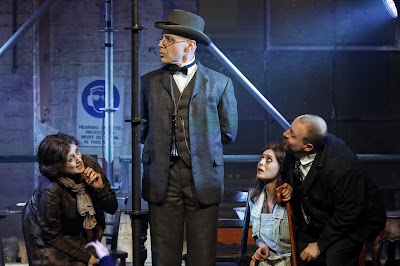Far from being of the same ilk, I was undergoing my own developmental transformation when composer Brian Howard’s world premiere adaptation of Franz Kafka’s 1913 novella, Metamorphosis, opened in Melbourne courtesy of Victorian State Opera in September, 1983. Now, 45 years later, Opera Australia has taken the work’s insightful fusion of disturbing drama and discordant soundscape and transformed it into an extraordinary and inquiring theatrical experience. The work, to a libretto by Steven Berkoff, traces the bizarre story of salesman Gregor Samsa’s nightmarish awakening to find himself metamorphosing into a beetle and his subsequent demise at the mercy of his family. For current OA Artistic Director Lyndon Terracini, Metamorphosis holds a special place, no doubt, given the fact that he sang the lead role at its 1983 premiere.
 |
| Simon Lobelson as Gregor Samsa |
Metamorphosis challenges your idea of opera, questions how far can you go in accepting change and crawls under your skin while it works its beguiling ways. Written when social democratic parties were on the rise in Europe, Kafka’s work can appear to comment on ideals that ironically resulted in alienated relationships, bureaucratic government order and increasingly sterile spaces. Via Lobelson’s remarkable performance, one is confronted with how usefulness turns to uselessness and ostracism, even when ‘love’ flickers around.
 |
| Taryn Fiebig, Adrian Tamburini, Julie Lea Goodwin and Christopher Hillier |
As the honoured Chief Clerk, who turns up to find out why Gregor has neglected to arrive at work, resonant and authoritative bass baritone Adrian Tamburini acts a treat in capturing the brusque and bumptious official in a spy-like, woodenly fashion. Precipitating Gregor’s final tragedy, the Samsas take in the Lodger, who broad-voiced Benjamin Rasheed effortlessly plays with pompous and punctilious distaste.
Howard’s score, one bereft of any melodious continuity or aria formation, begins with its challenges to the ear but it quickly sets the tone and allows the syllabic clarity of vocal lines to counterbalance it. Part of the score’s allure is its disquieting release, on which Howard works a mild comic patina that adds relief, then creates an affecting climax that comes close to an operatic trio before dishing it for a 180-degree turn towards frivolity. Screeching strings, warbling woodwinds, croaking brass and bass drum outbursts as part of beating percussion are alive in the score, adeptly managed by conductor Paul Fitzsimon and a small chamber orchestra sunken in the fore-stage. The result is time feeling irrelevant throughout its 105-minute duration with Matheson deserving just as much credit.
 |
| Simon Lobelson as Gregor and Julie Lea Goodwin as Greta |
Thompson’s set is an elaborately framed spatial marvel - a three-level industrial scaffolded structure incorporating stairs either side of the second-level caged room and flanked by ivory-coloured drapery on which projections of insects and spiders scatter. The Samsa home is evidently in the process of its own metamorphosis as period timber furniture vies with an industrial steel aesthetic around their staid, conservative demeanour. How much change is too much when it becomes a major test on our capabilities to adjust?
Not since Kate Miller-Heidke’s The Rabbits, which premiered in 2015, has Opera Australia presented Melbourne with either an Australian or chamber work that challenges audiences outside the grander repertoire. Signs are increasingly optimistic for future works like Metamorphosis that contribute greatly to opera’s richness and definition.
Metamorphosis
Opera Australia
Merlyn Theatre, The Coopers Malthouse
Until 27th October, 2018
Production Photos: Prudence Upton
No comments:
Post a Comment